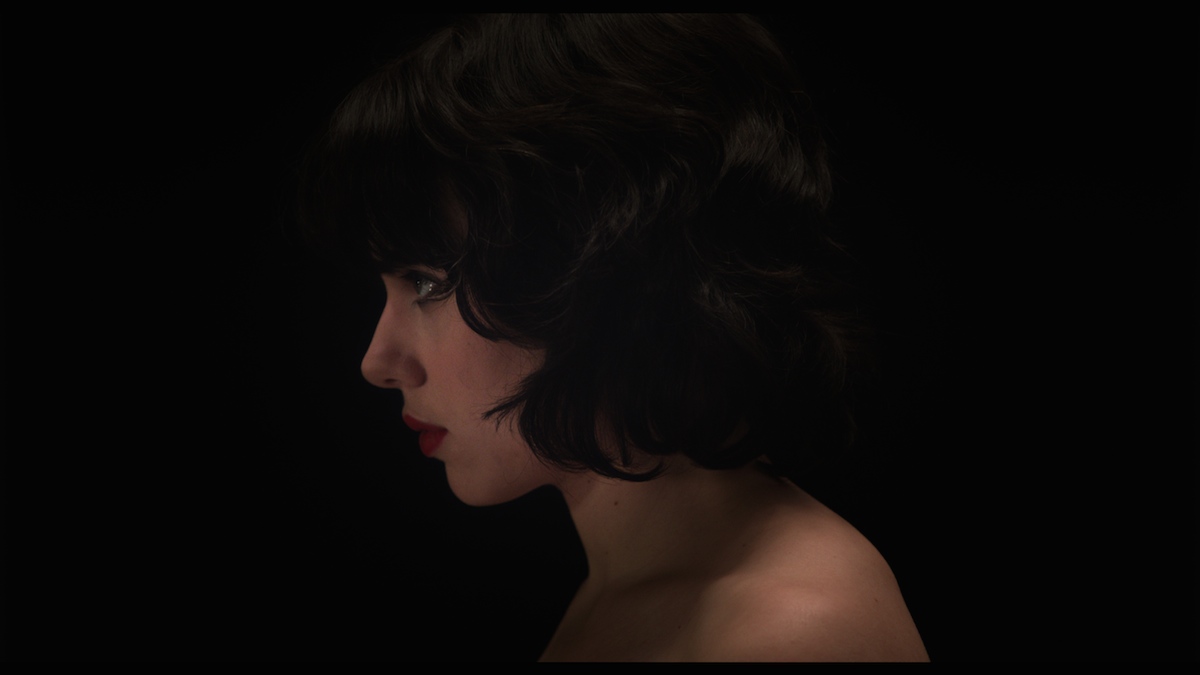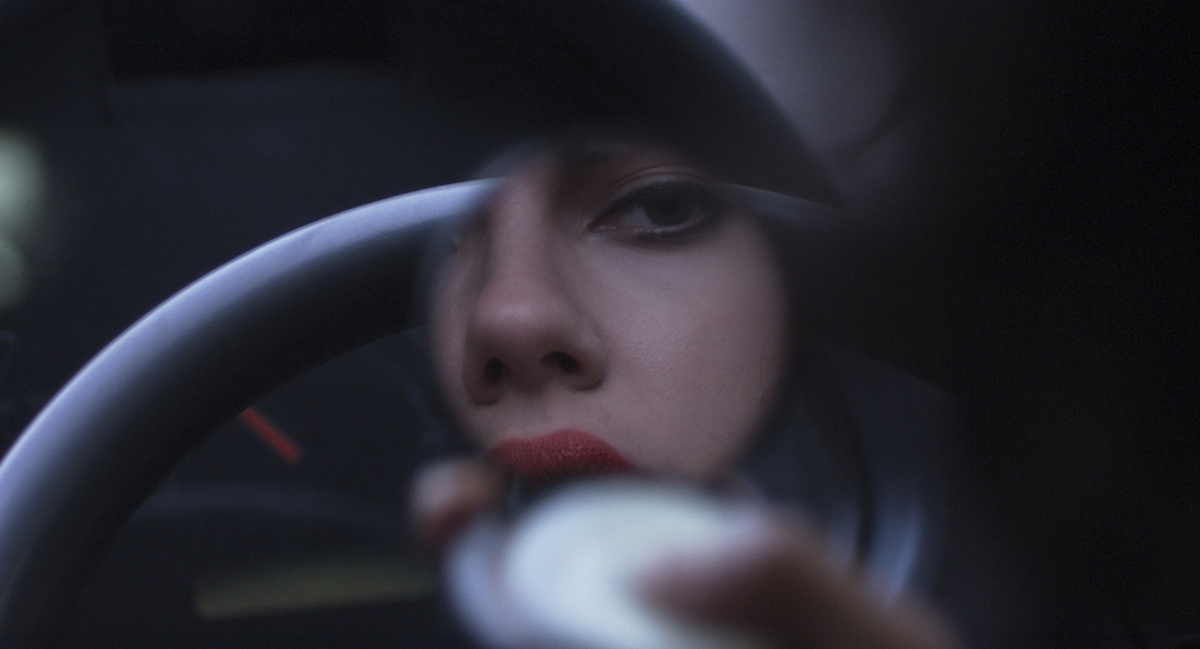Jonathan Glazer’s new film “Under the Skin” has been getting a lot of attention for its star, Scarlett Johansson, and for the way it was made. To film this science fiction story about an alien who drives around Scotland in a van, picking up men and then luring them to their deaths, Glazer placed hidden cameras in the van and had Johannson pick up non-actors who didn’t know, at first, that they were being filmed. If their interaction with Johannson seemed interesting, the crew would stop things, explain and ask them to be in the film. It’s a bold working method and gets remarkable results, but the attention to the method has overshadowed what an amazing and unconventional film it is. The science fiction label seems inadequate to this film, which has very little dialogue and is propelled forward by imagery rather than narrative. It picks up the ‘science fiction of ideas’ tradition of films like “2001: A Space Odyssey” and “The Man Who Fell to Earth“. Glazer, who made his reputation in commercials and music videos, has made two previous films, “Sexy Beast” and “Birth“, both noted for their bold imagery. Glazer sat down with us on a recent visit to Chicago.
Let’s start by talking about art and repetition. This movie
has a basic sequence of events that gets repeated with variation: She drives
around in the van, she picks up a man, they chat, she propositions them, they
go to her place, we see the men enveloped by the black oil. But this kind of
repetition is probably not what people would expect if you described the
barebones premise of the film: alien on the prowl for humans. Can you talk
about how you use repetition?
I think routine is what we wanted to show. Her job, her at
work. Really the first half of the film is that. It’s watching her go about her
job if you like. If you make her presence equivalent to ours, it’s like she’s
in a routine and a job she hates and she begins to lose her focus and leaves
her job. And part of that needed to be we needed to see that relentless cycle,
what she does. We needed to become familiar with what she does to then see what
she does differently. So the repetition was… And also, with the space she takes
the men to, it’s the same space, but we see more. It reveals more of itself
with each visit. So yes, I thought that repetition was a very important part of
the film’s structure.

It strikes me that you seem to be moving in a direction in
your features, moving away from conventional dialogue-driven storytelling. That
natural progression happens across the three films. Is that just an accident of
how we look at the three films?
No, I think you’re right. I think you’re right. I don’t know
whether it’s bloody-mindedness but I think I have a genuine interest in form,
and in the form of film, and in the opportunity in the medium of film. Film is
a kind of offshoot of theater, filmed theater. That doesn’t interest me enough.
I’m more closely connected to silent movies and the power of images and how
images somehow bypass the intellect and we view them at a deeper level. If the
images are propulsive and we are immersed in that story and we are moving
forward in the story with those images, I think it can be an extraordinary
experience. I suppose I am more led toward that.
As I was watching it, I thought this film has more roots in
experimental cinema, true experimental cinema, than it does in sci-fi. Sci-fi
seems like a not satisfying label at all.
No, it’s really not, is it?
Not to dismiss the world of sci fi; it’s just that I don’t
feel like that’s what you’ve made.
I agree. The other day I was thinking that we’ve made a
‘romantic tragedy.’ [laughs] As you’re trying to lock it into a genre… But the science
fiction that I’ve loved has been the science fiction that somehow remains
inscrutable. “Solaris” (1972) I am thinking of, “2001: A Space
Odyssey” of course. Something remains unfathomable or inscrutable about
the ideas. Not inscrutable, but just philosophical.
Bigger than aliens wanting to take over…
And shooting each other, right. Science fiction, I think,
offers a good conduit for ideas, as a genre. So I am not against the genre at
all. I think it’s a great genre. But I
like thinking of it as a starting point for this rather than working within the
borders of the genre.

Thinking of influences, one of the films that came to mind
for me was “The Man Who Fell to Earth.” Thinking of Nicolas Roeg’s
whole career, which in a way seems very related to the kind of work that you
are doing—very visual, elliptical storytelling, prefers not to use dialogue. Is
that an influence or is it that you are both visual thinkers?
I don’t know enough of Nic Roeg’s work. I’ve seen “Don’t
Look Now”, and what’s the film in the dessert with Jenny Agutter, I’m having a
mental block. [“Walkabout“] And I saw “The Man Who Fell to
Earth,” but I came to it as a Bowie fan. I need to watch that film again,
because it’s come up; people have mentioned it. I don’t know… I think British
cinema is a weird place. It’s a weird thing, British cinema. There are some
brilliant visualists, Powell and Pressburger, Ken Russell, Derek Jarman. Some
very interesting film makers who seem to have just done their own thing, quite
idiosyncratically. I guess I’ve always enjoyed that, but I think I feel closer
to Russian cinema and Italian cinema, actually, than I do to British cinema.
French cinema as well. We’re known for our music, not our films in England. Or
films are not loved in England. We’re a country of music and then film. France
it’s film and then music. That’s sort of the way it comes out. I think
filmmakers are a bit of a troubled bunch in England.
Let’s talk about visuals. This may be a bit of a chicken and
egg kind of question, but let’s try it. You’ve done quite a lot of commercial
work, which is noted for extremely striking visuals—that’s the way people tend
to sum up your work—and music video you’ve done, and then there are these three
films that I am going to describe as increasingly not Hollywood. You go from
“Sexy Beast,” a gangster film…
Lot of words.
And then “Birth,” which received kind of a mixed
reaction but is now being, I don’t know how to put it, recuperated by people
who are rediscovering it? It’s getting a second wind. Bu the question is—is the
commercial work and the music video work shaping you toward being a visually
oriented feature director, or were you always deeply visual and so got into
commercial work and music video?
That’s a fantastic chicken-and-egg question, you’re right.
Thank you for prefacing it with that. It could be either, honestly. It could be
that my schooling has been music videos and commercials. When I was growing up,
those were the opportunities I had to make the most of. Had I been born ten
years earlier I might have been in television. Ten years earlier, theater, or
whatever. So those are the opportunities I’ve had, and that has to have
informed the way I think about film. Before that I made film trailers, and that
was a massive part of learning how to think about film and about how to put
film together. Form, editing, context, the power of context and all of that
stuff. It must have informed how I worked because that was my education.
Whether I was going toward something that was my natural instinct, or whether
it has now become my natural instinct because of what I’ve done, I don’t know.
The other thing is, I am not dogmatic about it. I don’t say “I’m not going
to read any scripts with words in them!” or want things to make less and
less sense. Something has to insist itself on you. And it can be the strangest
spark from something completely surprising you in the oddest moment. You get
the inspiration or the muse that makes you want to go on to another thing. But
I suppose you’re always looking for that. You’re always alert to it. It’s in a
kin of constant state. For me I always feel like I am open, waiting to receive
something.

That brings up the book “Under the Skin”, which is in some
ways radically different than what you’ve produced. Do you see it is more of a
trigger? It’s a sort of satire, with this social and political critique, not
like your film at all.
It’s totally different. Yes, I think I do see it as a
trigger. Yeah, you are waiting for the trigger and then the trigger makes you
think of something altogether different. And then you’re sort of wrestling with
the idea of literal adaptation and ‘loosely based on’ adaptation. What I think
what is quite interesting in this case is that I have only read the book once.
Wow, that makes a lot of sense.
And Walter [Campbell], whom I co-wrote the script with,
didn’t read it at all. We went from my recollection of things I was interested
in from the book. So in a way, you take from it in the same way that you might
from an album that you listen to and think “Ah, that track, that
eleven-minute track, there was something in it that felt like this and felt
like that.” I met Michel Faber, the author [of the novel] for the first
time twelve years later, quite recently in London after a screening. I said to
Jim Wilson my producer that it was very strange meeting him. It was actually
wonderful meeting him, It was very cathartic, I think, for both of us. And Jim
said “Of course it was weird because you guys have been in a relationship
for twelve years and you’ve never met. It’s a strange thing. But I think you’re
right, your insight there is very true. It is a trigger for me, and a trigger
is all I need. But then again I am fascinated by great adaptations, like Fassbinder’s
“Berlin Alexanderplatz,” thirteen hours of majestic, extraordinary
work. I haven’t read the book that’s based on, but I’m told it’s very closely
linked to the book. So I can’t stand around and sort of dismiss adaptation as
just execution, saying something like ‘Who would want to go execute a book?
What’s the point, the book is there. The book exists, that’s the piece of
work.’ Because then you get a piece of work like that, which is a remarkable
piece of work and is, at least I am told, a very close adaptation of the book.
But who knows, I might do a very literal adaptation.
It could be “The Hunger Games“, page by page.
Right, but no, it might be “The Hunger Games,” but
set underground… [both laugh]
So you don’t want to do a literal adaptation, because
already you’re finding a way to change it.
The execution is something, the craft is something, but
somehow it seems to be a means to an end. The craft and the storytelling is the
beginning of something.
Let me ask you about the working method on the film, the
thing that every journalist interviewing you seems obsessed with. So much of
your work has been in media that are very structured—a song is precisely this
long and so that’s the video, an ad has to be specifically and clearly
described in advance because the client has to approve it—and here you are
working on a film in which, far more than anything you’ve done, you’re leaving
it to faith with all these hidden cameras in the van and in the nightclub.
You’re trusting that you’re going to get something but you don’t know what it
is. How did that feel as a working method?
Like the highest wire I’ve walked on, but the most exciting.
It’s liberating, that’s what it is. I loved it. I loved the fear of it. And the
other thing is that I was supported by people who were perfectly happy for me
to fail. Not happy for me to fail, but it was like, we know we might fail but
let’s just go for it. And the freedom that gives you…I’ve never felt so
supported before. I think that might be why I pushed as far as I did.

And of course one supporter is Scarlett Johansson. For her
there are two kinds of risk here. From the time she first agreed to be involved
with this, a decade ago, to completion, her career has moved to a different
place. That’s a career risk, But also, you’re putting her out on the roads in
this van and picking up strangers who don’t know at first that they are being
filmed and what is going on. And you put her in that crowded, rowdy nightclub.
There’s a legitimate physical risk. Why do you think she trusted you that much?
There were days when my producer Jim and I used to joke,
like imaging where we are, in the middle of nowhere and Scarlett’s on her ass in
mud and it’s pissing down rain and no one’s had lunch for three days, and we
were imaging a helicopter coming in from CAA [the Hollywood talent agency].
“Let’s get that girl out of here!” Like a rescue. So we used to joke
about it, but Scarlett was unflinching. She and I had talked about this over the
years. I never necessarily thought she was right at the time for it, she never
necessarily felt like she would want to do it, but for along while we were sort
of orbiting each other. And when we talked about doing it the way we
were—disguise, the hidden cameras, the methodology and the narrative being the
same thing—it was so obvious that it was Scarlett. And the story made so much
sense to her at that point as well. The more we cut it away to the molten core
of the story about her, the more she engaged with it. The more she talked about
it with insight the more I understood that she understood it. And our trust
just sort of intensified. We could totally both see it. We had a proper ‘whites
of the eyes’ meeting and I said “These are the things we’re going to need
to do. I’m not going to change my mind on these things. We are going to need to
do these things.” And she agreed and was true to her word throughout. And
truly fearless. I think she’s done her best work because of that. She risked
everything, And that’s when you have a chance to do something, to succeed at
something.
Let me ask you about the critical reception of
“Birth” and it’s rebirth. What do you make about that and about the
divided response to “Under the Skin.”
I’ll tell you, I feel quite good when the films come out,
because the important thing to do is not to confuse whether something is good
with whether it is well received. They are two completely different things. And
if you’re worried that one equals the other, then I don’t think that’s healthy.
For me I know one isn’t the other. All I care about I whether it’s good.
Whether it is well received or badly received is irrelevant to me. What’s
relevant is that I think it’s good. And if I think it’s good then there will be
other people out there who will also at some point find it and think it’s good
too. And that’s okay, and if it takes a month or ten or fifteen or twenty
years, that doesn’t matter. I think it’s important to put something out there
truthfully. So I don’t follow the criticism. The divisiveness of the reaction?
I’d rather that than a consensus of “Well, I didn’t mind it.”
A consensus doesn’t hurt…
But if I hated my work and ten million people loved it, I’d
throw a rope over a beam. If I loved it and ten million people hated it, I’m
okay, I’m a happy man.
You’re on the Kubrick trajectory in terms of time between
films, getting longer with each film. Do we have to wait until 2027? Or is
there a feature in the future at all?
Yeah, that’s interesting. But I think I feel more encouraged
than ever, actually. It’s a lonely place, a solitary task, even though you’re
working with people who are putting their blood and guts into it. I was
surrounded by these incredible collaborators who I’ve been working with for
years. You can’t make a film all on your own, you need people to do it. But
there’s still something very solitary about it, and you have to have the energy
to go back into that room in your head again. You have to go back into that
place and shut things out while you look for it. It’s quite hard. I’m not ready
to jump back into that mental space yet, because it takes a lot out of you. And
it’s a private thing and then there it is. I hope it won’t take as long.
Hopefully I’ll make another film, I may not. I may make furniture. I don’t yet
know what it will be.











